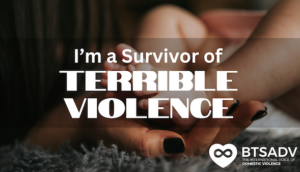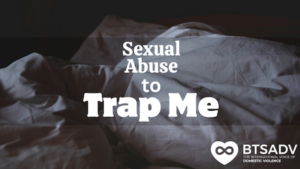Learning that someone you know is in an abusive relationship can come as a surprise to many. The warning signs are not always clear, and most people suffering DV put on an Oscar-worthy performance that the relationship is A-okay all around, when in fact it is anything but.
So what can you do if you do learn that someone you care about is in an abusive relationship? Though it is only natural to immediately want to jump in and save them, it isn’t often the best choice. There are many reasons why it is difficult to leave a violent relationship, and just as many reasons why it can be downright dangerous, too.
Here are some helpful tips on how to offer your person the best form of support, regardless what stage of their journey they are in.
If they start talking about it
Maybe you suspected your friend, family member, or coworker had a rocky relationship. Maybe you’re hearing about it for the first time. Regardless, the first two things you must avoid doing when your person comes forward and confesses that things are bad, are:
- Do not express doubt or disbelief (“Well, that just can’t be! Are you sure?”)
- Do not side with their abuser (“But so-and-so is such a wonderful person/great parent/active church member!”)
Instead, let them know that you heard what they said, that you believe what they just told you, and most importantly, let them know that you are there to support them however you can.
Some things to say to your person when they confess that they are in an abusive/toxic/violent relationship:
- I believe you
- How can I help?
- Do you have a safe place to stay if things get bad?
- You can stay with me/us if you need to (assuming this is something that you are genuinely able to provide)
- Can I help you find a safe place to stay? (assuming you are not in a position where you can offer them shelter in your home)
- Is there anything that I can look up for you? (abusers frequently keep close tabs on their victim’s cell phones and search history. Your person may not be able to look up the number to a hotline, or explore what their legal rights are, etc)
What your person needs most at this stage is to see that they are not crazy. In nearly every abusive relationship, the abusive partner will use tactics to convince their victim that they (the victim) are “crazy”, or overly emotional, or too sensitive. This ensures that the victim will be less likely to talk about the abuses going on at home, because they will doubt themselves. So if your person has come forward and they have let you in on some of what has been going on at home, the most important thing for you to do is reassure them that they are not overreacting, nor are they “crazy”. Your person needs your help gaining clarity that their abusive relationship really is “that bad”, and that they really do need to, for their own well-being and safety, escape their abuser.
When they start planning their escape
For those of us lucky enough to have never experienced an abusive relationship, it may seem like the idea of an “escape plan” is far-fetched and unnecessary. But with an abuser, this couldn’t be farther from the truth.
Statistically, abusers become their most dangerous selves when their partner voices their intention to leave, or if they catch their partner leaving them (this can happen if the victim attempts to leave without informing their abuser, but they wind up getting “caught” if the abuser returns home unexpectedly).
Escape plans help assure that the victim of DV has everything they need in order to leave swiftly, safely, and with resources in place so that their departure is a sustainable one.
Some things that you can do to help:
- Help your person secure a place to stay. Be it at your home, a friend’s home, or a shelter
- Offer to safeguard your person’s important documents, new bank cards, new cell phone
- Help them find an appropriate support network. For some this can be a church, for others it can be groups that come together at a local shelter, but a group of people who have been through similar hardships can be invaluable to someone who is just getting out of an abusive relationship
- Help secure material resources for your person. This can be clothes, so that they don’t have to leave with bags and bags full; transportation; basic furnishings and or kitchenware if they are able to get set up in an apartment of their own
- Advise them to set up a new bank account and start putting some money away in it
- Advise them to get a new phone
- Help them document instances of abuse. Many victims are too afraid to report their abuser to authorities (and with good reason, because this can often lead to even more dangerous and violent behavior from the abuser), but it can still help to have a journal of listed events that have taken place. Even better if these instances are dated, or if there are any text messages, emails, written letters, or photographs supporting the incidents.
When they are ready to make their escape
Even with all of the planning that has likely taken place up until this point, your person will still need some help in getting out of their current dwelling and away from their abuser. Sometimes this may involve helping them carry their packed up personal effects out of their home. Other times, it can mean being ready with transportation. And yet other times, it can be as simple as showing up with a trusted friend or two, cell phones in hand, ready if the abuser comes home unexpectedly so that authorities can be informed immediately.
- Be available to pick them up if you can, or arrange other transportation
- Do not post about any of this on social media. It doesn’t matter how vague you think you’re being, or how tight you think your privacy settings are, this is one of the worst things that a person can do. It is one of the easiest ways for the abuser to catch wind of what’s happening, and again: abusers become their most dangerous and violent selves when they learn that their partner is going to leave them
- Help them settle into their new space, even if that means accompanying them to a shelter
- Remind them that you are their for them, even after they’ve safely left their toxic partner
After they have safely left their abuser
This, to most people, may seem like a good time to return to things as normal. Your person is safely away from their abuser, and you have done all you can to help them reach that point. But, alas, transitioning to a life free from one’s abuser is a whole other can of worms. Interestingly, some victims find the calm after the storm to be its own form of unexpected anxiety, and the support of a dear friend can be tremendously beneficial.
Here are some ways you can continue to show your support:
- Ask them what other things they might need as they transition to a life free from their abuser
- Help them research their legal rights. These vary by state, and they vary based on whether the two parties were married, shared property, or had children together
- If your person permits you to do so, advise their new neighbors of the situation and give them a description of your person’s abuser. It is not at all uncommon, in fact it is to be expected, that the abuser will come around their victim’s new neighborhood, dwelling, and/or place of work. It can be helpful for those living or working around your person to know what’s going on, and what to be on the look-out for
If they decide to return to their abuser
This can be the toughest situation for a friend or family member to have to witness. When we are not the ones in the abusive relationship, it can seem like the most illogical decision a person could possibly choose for themselves. But because we are not in that situation, we cannot pretend to know how we would behave if we were.
To be supportive if your person decides to go back to their abuser, consider the following:
- Remind them that you will remain there for them whatever they decide to do
- Check in on them regularly. Whether it’s via phone, text, or email, make sure that you reach out regularly, so that (A) they know you still care, and (B) you know that they are well enough to be able to respond to you.
- If you do not hear back from your person, report it. Most police officers will insist there is nothing to worry about. Most will remind you that you are asking them to check up on an adult, who is old enough to do whatever they please, go wherever they please, and associate with whomever they please. Report it anyway. Make a stink at your local station if you have to, until you are heard and the officer you are dealing with sends out a car to perform a welfare check.
- Take care of yourself so that if/when they decide to leave again, you will be able to provide them with the same level of support
Though it may seem like leaving a relationship should be a relatively easy endeavor, it is absolutely not so when it comes to leaving an abusive relationship. It takes tremendous courage, a great deal of support, and a very skillfully thought out escape plan. This can be all the more complicated and difficult if there are children involved. So if it does happen that you find yourself listening to someone in your life talk about the difficulty they are experiencing in their relationship, and that it isn’t in fact all smiles and sunshine, be prepared to help them seek the support they are surely going to need in order to get out safely. Though the list of things one can do for someone facing DV may seem long, don’t feel that you have to do it all on your own. Ask your person if there is anyone else they trust to help start planning their escape. Guide them towards helpful resources like support groups and hotlines. And most importantly, do not judge. There are a multitude of reasons why it takes a victim a long time to even come forward and confide in another person about how bad their relationship is, and there are even more reasons why they don’t escape sooner. Give them your ear, your support, and your compassion, and help them remember that it will be better on the other side of things, and that once they get there, you will still be there for them.









